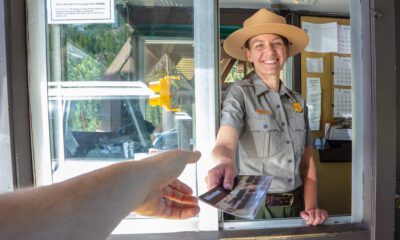Uncategorized
Food conditioning a risk to area wildlife
Published
6 years agoon
Posted By
Outlaw Partners

By Jessianne Wright EBS Contributor
BIG SKY – Living in the mountainous landscape of Big Sky, residents and visitors come into contact with area wildlife on a daily basis. Whether watching birds chirp on a tree branch, or catching a fleeting glimpse of a fox, we’re fully immersed in a wildland ecosystem.
However, this immersion can come at a cost to area wildlife—including two black bears captured near Big Sky and euthanized last year—when humans make poor stewardship decisions.
Food-conditioned animals are a common problem for communities at the wildland-urban interface like Big Sky, as well as increasingly in our national parks.
Early in January, officials from Grand Teton National Park released a statement after a food-conditioned red fox was killed for displaying bold behavior like approaching people and vehicles in search of food.
“Destruction of a wild animal is one of the most difficult actions we have to take as park stewards,” said Superintendent David Vela in the release. “Hopefully this can serve as a cautionary reminder. I encourage everyone to help protect wildlife by securing food sources, including dog food and fish scraps, and by using the ‘scare, don’t stare’ tactic to discourage approaching foxes.”
According to the release, the “scare, don’t stare” tactic includes yelling, clapping, stomping, and avoiding eye contact in an effort to dissuade food-conditioned animals from approaching humans. It does not need to be used with foxes that behave naturally.
Yellowstone National Park has also experienced issues with food conditioning. All park animals are susceptible, but grizzlies, black bears, coyotes, fox, ground squirrels and chipmunks are particularly at risk, said park bear biologist Kerry Gunther. In September, park officials killed an aggressive grizzly bear near Heart Lake, in the southern part of Yellowstone, after repeated conflicts with humans beginning in 2015.
In a statement released after the bear was killed, officials said the incident served as a reminder that “a fed bear is a dead bear. Allowing bears to obtain human food even once often leads to them becoming aggressive toward people.”
Within Yellowstone and Grand Teton national parks, visitors are required to use wildlife-resistant garbage cans and dumpsters, as well as food storage lockers. Those entering either park are also told not to feed wildlife.
According to Montana Fish, Wildlife and Parks, supplemental feeding can lead to a series of negative effects, which includes human dependency; health problems when human food is consumed that is not safe for the animal; nuisance behavior such as getting into garbage cans or approaching homes; or increased congregation in a single area, which may lead to the spread of diseases or increase the incidence of fighting and injury among animals.
“In essence,” said FWP spokeswoman Andrea Jones, “while it may seem well-intentioned, feeding wildlife is usually detrimental for an animal’s long-term well-being.”
Last summer and fall, FWP officials received reports of black bears in Big Sky entering occupied vacation rentals, as well as getting into garbage cans and vehicles. At least two of the bears were captured and euthanized, while three others were captured and relocated.
In an effort to minimize human-wildlife conflict, most homeowner associations in Big Sky have strict rules about feeding or attracting wildlife and have taken measures to reduce conflict. At Moonlight Basin, for example, there is a centralized trash collection site so trash cans are not spread throughout the development.
Ben Holst, executive director of community associations for Lone Mountain Land Company, manages Spanish Peaks and Moonlight Basin. “We’ve not had a problem with habituated bears in our developments,” he said, adding that while smaller mammals like fox and squirrel are around, they have not become a problem either. “The covenants at Spanish Peaks and Moonlight Basin are very clear about prohibition on feeding wildlife, or having wildlife attractants like salt licks, bird feeders or other foods.”
The Big Sky Owners Association, which manages more than 2,300 properties, has also worked with its members on wildlife education. On the BSOA website, homeowners can easily report a bear conflict through a partnership with Big Sky Community Organization’s Bear Smart program.
Since 1994, trends in human-bear conflicts that resulted in bear relocation or lethal removal have more than tripled. As a response to this increasing trend, BSCO initiated the Bear Smart program in 2013 as an educational program for people living in bear country. The Bear Smart initiative includes distribution of bear identification material and how to use bear spray, as well as a reporting system for bear sightings.
Big Sky residents and visitors should remain vigilant in avoiding human-wildlife conflicts throughout the winter, and should be bear-aware as well. Early in January a black bear was spotted roaming around the Yellowstone Club, and according to FWP bear biologist Kevin Frey, while it’s rather surprising to see a bear up and about in January, it’s not necessarily abnormal.
“Over the years, I have seen several bears on ski hills in the middle of winter,” he wrote in an email to EBS. “Odds are, the bears got disturbed by a change in the snow over the den, be it from a skier in the trees, the snow groomer or natural snow shift. This bear appeared to be a healthy adult, not a thin sub-adult awake to due hunger.”
For more information about the threats of feeding wildlife, visit fwp.mt.gov/fishAndWildlife/livingWithWildlife/feeding. To learn about BSCO’s Bear Smart campaign, visit bscomt.org/natural-resource-council/bear-smart.
The Outlaw Partners is a creative marketing, media and events company based in Big Sky, Montana.


Upcoming Events
april, 2024
Event Type :
All
All
Arts
Education
Music
Other
Sports
Event Details
Children turning 5 on or before 9/10/2024:
more
Event Details
Children turning 5 on or before
9/10/2024: Kindergarten
enrollment for the 2024-2025 school year can be completed by following the
registration process now.
Children
born on or after September 11, 2019: 4K enrollment is now open for
families that have a 4-year-old they would like to enroll in our program for
the 2023-2024 school year. Please complete the 4K Interest Form to
express your interest. Completing this form does not guarantee enrollment into
the 4K program. Enrollment is capped at twenty 4-year-olds currently
residing within Big Sky School District boundary full time and will be
determined by birth date in calendar order of those born on or after September
11, 2018. Interest form closes on May 30th.
Enrollment now is critical for fall preparations. Thank you!
Time
February 26 (Monday) - April 21 (Sunday)
Event Details
Saturday, March 23rd 6:00-8:00pm We will combine the heart-opening powers of cacao with the transcendental powers of breathwork and sound. Together, these practices will give us the opportunity for a deep
more
Event Details
Saturday, March 23rd 6:00-8:00pm
Time
March 23 (Saturday) 6:00 pm - April 23 (Tuesday) 8:00 pm
Location
Santosha Wellness Center
169 Snowy Mountain Circle
Event Details
We all are familiar with using a limited palette, but do you use one? Do you know how to use a
more
Event Details
We all are familiar with using a limited palette, but do you use one? Do you know how to use a limited palette to create different color combinations? Are you tired of carrying around 15-20 different tubes when you paint plein air? Have you ever wanted to create a certain “mood” in a painting but failed? Do you create a lot of mud? Do you struggle to achieve color harmony? All these problems are addressed in John’s workbook in clear and concise language!
Based on the bestselling “Limited Palatte, Unlimited Color” workbook written by John Pototschnik, the workshop is run by Maggie Shane and Annie McCoy, accomplished landscape (acrylic) and plein air (oil) artists,exhibitors at the Big Sky Artists’ Studio & Gallery and members of the Big Sky Artists Collective.
Each student will receive a copy of “Limited Palette, Unlimited Color” to keep and take home to continue your limited palette journey. We will show you how to use the color wheel and mix your own clean mixtures to successfully create a mood for your paintings.
Each day, we will create a different limited palette color chart and paint a version of a simple landscape using John’s directives. You will then be able to go home and paint more schemes using the book for guidance.
Workshop is open to painters (oil or acrylic) of any level although students must have some basic knowledge of the medium he or she uses. Students will be provided the book ($92 value), color wheel, value scale and canvas papers to complete the daily exercises.
Sundays, April 14, 21 and 28, 2024
Noon until 6PM.
$170.
Time
14 (Sunday) 12:00 pm - 28 (Sunday) 6:00 pm
Event Details
Everyone is invited to join us in celebrating 2 years of arts education in the BASE Art Studio with us! Take a tour
Event Details
Everyone is invited to join us in celebrating 2 years of arts education in the BASE Art Studio with us! Take a tour of the studio, meet our instructors, and meet other artists of all levels in our community. We’ll be getting creative and you’ll have the chance to make your very own artful button pin.
Stick around for our Volunteer Appreciation and Social beginning at 6:30 p.m.!
Time
(Thursday) 5:30 pm - 6:30 pm
Location
BASE
285 Simkins Dr










